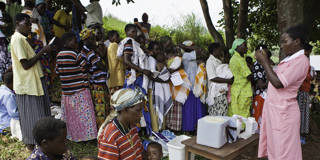Women have long been expected to volunteer as community-health workers, providing essential services in low- and middle-income countries for little to no pay. But governments that professionalize CHWs, which includes offering accreditation, training, and minimum wages, will accelerate progress toward “health for all.”
CLARKSVILLE, MD/KAMPALA – At least six million women worldwide provide unpaid or grossly underpaid labor in community-health centers, often in low- and middle-income countries (LMICs). Many work as community-health workers. But, though this is a skilled job that should be salaried, only 34 countries offer CHWs accreditation, training, and salaries, leaving the majority exploited and therefore less effective for their patients. If we are serious about making “health for all” a global priority, this must change.
CHWs are crucial to strengthening health systems at the national level: they have been proven to improve maternal- and child-health services, expand access to family planning, and support prevention and care for both noncommunicable and infectious diseases. Deploying CHWs who consistently provide just 30 lifesaving health services in countries with the highest disease burden would save as many as 6.9 million lives annually and reduce child mortality by almost half. Moreover, the COVID-19 pandemic demonstrated how resilient community-health programs can provide essential services even in the face of great adversity.
But such programs will reach their full potential only with service design that adheres to evidence-based best practices. That means treating CHWs as professionals who require training, fair pay, and safe working conditions. When used as a stopgap solution or a source of cheap labor, CHWs are less effective than their well-resourced counterparts.

CLARKSVILLE, MD/KAMPALA – At least six million women worldwide provide unpaid or grossly underpaid labor in community-health centers, often in low- and middle-income countries (LMICs). Many work as community-health workers. But, though this is a skilled job that should be salaried, only 34 countries offer CHWs accreditation, training, and salaries, leaving the majority exploited and therefore less effective for their patients. If we are serious about making “health for all” a global priority, this must change.
CHWs are crucial to strengthening health systems at the national level: they have been proven to improve maternal- and child-health services, expand access to family planning, and support prevention and care for both noncommunicable and infectious diseases. Deploying CHWs who consistently provide just 30 lifesaving health services in countries with the highest disease burden would save as many as 6.9 million lives annually and reduce child mortality by almost half. Moreover, the COVID-19 pandemic demonstrated how resilient community-health programs can provide essential services even in the face of great adversity.
But such programs will reach their full potential only with service design that adheres to evidence-based best practices. That means treating CHWs as professionals who require training, fair pay, and safe working conditions. When used as a stopgap solution or a source of cheap labor, CHWs are less effective than their well-resourced counterparts.